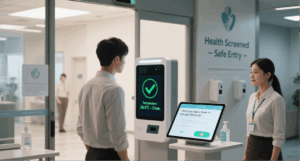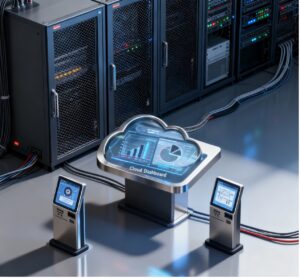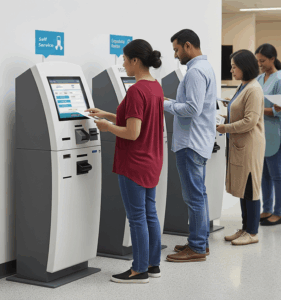
News & Updates

What scalability features should enterprise-grade kiosk solutions offer for multi-location deployment?
Enterprise-grade kiosk solutions for multi-location deployment must incorporate centralized management capabilities, cloud-based infrastructure, and modular hardware options to support dynamic business growth. These scalability features enable organizations to efficiently manage hundreds or thousands of kiosks across diverse locations while maintaining consistent performance and user experiences.
The most critical scalability features include real-time remote monitoring, automated software updates, customizable interfaces for regional requirements, and robust integration capabilities with existing enterprise systems. These elements collectively ensure seamless operation, reduced maintenance costs, and the flexibility to adapt to evolving business needs across multiple sites.
What centralized management capabilities are essential for scalable kiosk deployment?
Centralized management systems provide administrators with unified control over all deployed kiosks through a single interface. This capability is fundamental for organizations managing multiple locations as it eliminates the need for on-site management at each deployment point.
Effective centralized management includes real-time monitoring dashboards that display kiosk status, performance metrics, and operational alerts across all locations. Administrative tools should enable remote configuration changes, content updates, and troubleshooting capabilities without requiring physical access to individual units.
- Real-time status monitoring and performance analytics for all deployed units
- Remote configuration management for system settings and operational parameters
- Automated alert systems for hardware failures, software issues, and maintenance requirements
- Role-based access controls for different administrative levels and regional managers
- Comprehensive audit trails and compliance reporting capabilities
Advanced centralized management platforms also support bulk operations, allowing administrators to deploy updates, changes, or new configurations to multiple kiosks simultaneously, significantly reducing operational overhead for large-scale deployments.
How does cloud-based infrastructure enhance kiosk scalability?
Cloud-based infrastructure provides the foundation for truly scalable kiosk deployments by enabling real-time data synchronization, automatic software updates, and elastic resource allocation based on demand. This architecture eliminates the limitations of on-premises servers and supports unlimited expansion potential.
Cloud platforms facilitate seamless integration between kiosks and enterprise systems while providing robust data analytics and performance insights across all locations. The infrastructure automatically scales to accommodate increased traffic during peak periods and supports rapid deployment of new locations.
- Automatic software updates and security patches deployed simultaneously across all units
- Real-time data synchronization ensuring consistency across all deployment locations
- Elastic computing resources that scale automatically based on usage demands
- Centralized data storage with advanced analytics and reporting capabilities
- Enhanced security through cloud-native encryption and access controls
Cloud infrastructure also enables advanced features such as predictive maintenance, usage pattern analysis, and dynamic content delivery that optimizes performance based on location-specific requirements and user behaviors.
What integration capabilities are required for enterprise system compatibility?
Comprehensive integration capabilities ensure kiosks function as seamless extensions of existing enterprise systems rather than isolated solutions. This integration is essential for maintaining data consistency, operational efficiency, and unified user experiences across all customer touchpoints.
Enterprise-grade kiosk solutions must support standard integration protocols and provide robust APIs for connecting with CRM systems, payment processors, inventory management platforms, and customer databases. These integrations enable real-time data exchange and synchronized operations.
- RESTful APIs and SDKs for custom integration development and third-party connections
- Pre-built connectors for common enterprise systems including ERP, CRM, and POS platforms
- Real-time data synchronization with inventory management and customer databases
- Secure payment processing integration with multiple gateway options
- Single sign-on (SSO) compatibility for unified user authentication
Advanced integration features include webhook support for event-driven communications, data transformation tools for format compatibility, and failover mechanisms that maintain operations during system maintenance or connectivity issues.
Which hardware modularity features support diverse deployment environments?
Modular hardware design enables organizations to deploy appropriate kiosk configurations for specific environments while maintaining software compatibility and centralized management capabilities. This flexibility is crucial for enterprises operating across diverse locations with varying space constraints, security requirements, and user demographics.
Scalable hardware solutions offer interchangeable components, mounting options, and peripheral devices that can be configured for indoor retail environments, outdoor public spaces, high-security facilities, or compact office settings without requiring separate management systems.
- Modular display options ranging from compact tablets to large interactive screens
- Interchangeable peripheral devices including printers, scanners, and payment terminals
- Multiple mounting configurations for wall-mount, floor-standing, or countertop deployment
- Environmental protection options for outdoor or harsh industrial environments
- Flexible connectivity options supporting wired, wireless, and cellular network connections
Hardware modularity also extends to security features, with options for biometric readers, card scanners, and surveillance integration that can be added or removed based on location-specific requirements while maintaining consistent software functionality.
- Centralized management systems reduce operational overhead by enabling remote administration of multiple locations from a unified interface
- Cloud-based infrastructure provides unlimited scalability potential with automatic updates, real-time synchronization, and elastic resource allocation
- Comprehensive integration capabilities ensure seamless compatibility with existing enterprise systems through APIs, pre-built connectors, and real-time data exchange
- Modular hardware design supports diverse deployment environments while maintaining software compatibility and centralized management control
- Advanced analytics and monitoring capabilities enable data-driven optimization and predictive maintenance across all deployed locations
| Scalability Feature | ATT Group Solutions | Basic Alternatives |
| Centralized Management | ✔️ Unified cloud-based administration with real-time monitoring and bulk operations | ✘ Limited to individual unit management |
| Enterprise Integration | ✔️ Comprehensive APIs, pre-built connectors, and real-time data synchronization | Partial integration options only |
| Hardware Modularity | ✔️ Interchangeable components with consistent software compatibility across configurations | ✘ Fixed configurations with limited flexibility |
| Cloud Infrastructure | ✔️ Auto-scaling resources with advanced analytics and predictive maintenance capabilities | Partial cloud features |
| Multi-Location Support | ✔️ Purpose-built for enterprise deployment with 24/7 technical support and compliance certification | ✘ Limited scalability beyond pilot deployments |
Implementing scalable kiosk solutions for sustainable multi-location growth
The future of enterprise kiosk deployment depends on selecting solutions that combine robust scalability features with proven enterprise-grade reliability. Organizations that invest in comprehensive centralized management, cloud-native infrastructure, and modular hardware design position themselves for sustainable growth while maintaining operational efficiency across all locations. Advanced analytics and integration capabilities will continue to drive competitive advantages through improved customer experiences and data-driven operational insights.
Partner with ATT Group to deploy enterprise-grade kiosk solutions that scale with your multi-location business growth, featuring comprehensive management tools, cloud infrastructure, and modular hardware designed for diverse deployment environments.
Contact ATT at infosoft-sales@attsystemsgroup.com for details.
Frequently Asked Questions
Q: How do centralized management features simplify multi-location kiosk deployments?
A: Centralized management lets you monitor, update, and troubleshoot all kiosks remotely from one dashboard, reducing the need for on-site visits and saving time across locations.
Q: Why is cloud infrastructure important for scaling enterprise kiosks?
A: Cloud infrastructure enables automatic updates, real-time data syncing, and resource scaling so you can easily add new kiosks or handle surges in usage without manual intervention.
Q: What integration capabilities should I look for to ensure my kiosks work with existing enterprise systems?
A: Look for support for APIs, pre-built connectors, and real-time data exchange to ensure seamless connectivity with your CRM, payment systems, and databases.
Q: How does hardware modularity benefit organizations with diverse deployment environments?
A: Modular hardware allows you to tailor each kiosk’s configuration such as screens, peripherals, and mounts to fit different locations while keeping software and management consistent.
Q: In what ways does ATT Group’s kiosk solution differ from basic alternatives for multi-location scalability?
A: ATT Group offers unified cloud-based management, real-time monitoring, robust enterprise integrations, and fully modular hardware designed specifically for large-scale, multi-site deployments.
Q: How do automated software updates and predictive maintenance improve kiosk uptime?
A: Automated updates ensure all kiosks stay secure and current, while predictive maintenance uses data analytics to anticipate issues before they cause downtime.
Q: Can I customize kiosk interfaces for different regions or user groups?
A: Yes, scalable solutions support customizable interfaces so you can tailor content and functionality to local needs or specific audiences at each location.
Contact ATT at infosoft-sales@attsystemsgroup.com for details.
Send us a message
Contact Information
Address:
35 Ubi Crescent, ATT Building, Singapore, 408585
Phone:
Email:
Website:
www.attsystemsgroup.com






